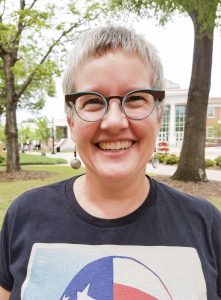
Frannie James was a white suburban teenager from Orange County, California, when she moved to rural Alabama.
Her father was a physician in Goodwater, where she’d visited periodically since she was 8 years old. Through those visits, James constructed her own context for the differences in culture, capital and relationships between people in her hometown and in the rural South, which, at the time, was just a few years removed from integration of schools and public spaces.
But those experiences were just snapshots of a story that was still being told. And James wouldn’t truly develop an understanding and appreciation for the differences between people until she relocated to Goodwater. Then, she was 14 and attended public school, where she’d become a racial and socioeconomic minority.
“I was white and the doctor’s kid, and at that time someone like me would be at one of the academies,” James said. “The kids I went to school with were the first to integrate … we weren’t far removed from a lot of the chaos that existed in the South, but my dad didn’t think about it – he supported public schools.”
Those years would eventually shape James’ world views and career path to The University of Alabama, where she’s been involved in international education since 1990. James, who was announced this week as the 2017 Buford Peace Award winner, designed and currently directs Culturally Speaking, a class in which degree-seeking UA students meet with small groups of English Language Institute students twice a week for discussions focused on issues of culture.
During the last few years, James has coordinated the ELI Intercultural Experience, a set of ELI classes that involves UA students integrating into ELI classes.
James’ mission is to give UA students the opportunity to have the same cultural awakenings she had as a youth, as an undergraduate student at UA, backpacking through Europe, and through her professional career at UA.
“When I teach, I’m a firm believer in experiencing difference. And if the students have someone to guide them through it, it opens them up, and there’s no way to not have a sense of social justice after that experience. I want to impart a sense of curiosity about the world around them.”
James said she cried when learned she’d been named the recipient of the Buford Award, given annually to a UA faculty or staff member who, through teaching, research and professional practice and personal life, promotes justice and peace. James had been away from campus last week, advocating for healthcare at congressional town halls as part of her work with Kudzu Coalition of West Alabama, a newly formed collection of progressive voices committed to transforming our community through collaborative, direct action.
“I immediately thought ‘I’m not deserving of this,’” James said.
Dr. Carol Drolen, associate professor in the UA School of Social Work, nominated James after reading a news article in January that referenced James’ advocacy of international students following an executive order that temporarily suspended immigration from select countries in Africa and the Middle East. Drolen also noted James’ advocacy style, which incorporates many of social work’s values.
“She exemplifies these values, not in a stern or harsh manner, nor does she degrade those in power as a way to align herself with those in need,” Drolen said. “Rather, she works by using the tools social workers are familiar with, such as consensus building, being mindful and aware, listening, not judging, and seeking commonalities.
James has taught intercultural communication and global studies for 11 years in Capstone International Center’s Global Studies Certificate. She also helped prep Honors College students for two three-week service-learning trips to Nicaragua. James taught ESL at the ELI for 16 years prior to working with Capstone International’s Global Studies Certificate, and during the time, she said the aftermath of 9/11, which included temporary bans of student visas and a dip in international enrollment, provided added motivation to help nurture a welcoming campus community at UA.
However, her immersion in international education at UA almost didn’t happen. She began her career as a secretary in the English as a Second Language department. Her concept of “international” grew from thinking of Europe, where she’d met and married a Frenchman, to “Japan, Saudi Arabia and South America.” She then earned a master’s at UA in Teaching English to Speakers of Other Languages because she thought she’d end up living in other countries.
“You work with people from other countries and gain a great respect for who they are and what their experiences are,” James said. “And I just grew to love the work I do here.”
Contact
David Miller, UA Media Relations, 205/348-0825, david.c.miller@ua.edu
Source
Frannie James, instructor, Capstone International Programs, 205/348-5256, frannie.james@ua.edu
